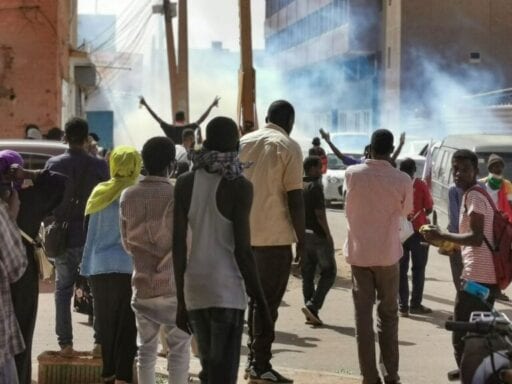A protester crackdown and a military purge show Sudan’s shaky transition toward democracy.
Sudan appears to have taken a disturbing step backward on its path toward democracy.
On Thursday, Sudanese security forces fired tear gas at demonstrators in Khartoum who were protesting the government’s removal of officers and soldiers who’d supported the revolution that overthrew the country’s longtime dictator, Omar al-Bashir, in April 2019.
After the coup against al-Bashir, an 11-member Sovereign Council took over in August; it will first be headed by senior military official Abdel Fattah al-Burhan for 21 months, and then will be chaired by a civilian for 18 months.
This 39-month transitional government is expected to uphold peace and take steps to move the country toward democracy, culminating in elections in 2022. But Thursday’s retaliation against protesters says something different, calling into question the sincerity of the Sovereign Council.
On Tuesday, the Sudanese armed forces released a statement that includes the names of the officers and soldiers who were to be dismissed.
In response, the Sudanese Professionals Association (SPA), a group that has been an active leader in the revolution against al-Bashir, called for a demonstration on Thursday to protest the discharge of the officers and to demand reform.
The protests were “against the referral of a Sudanese army officer, 1st Lt. Muhammad Siddiq, who supported the protesters during the first sit-in in front of the army headquarters,” Abdelrahman Mohamed al-Gasim, the external relations secretary of the Darfur Bar Association, told me. “The protesters are demanding that he be returned to the army.”
He added that there are other dismissed troops who also sided with the revolution that he cannot confirm yet.
On Facebook, the SPA later shared photographs and videos that showed injured protesters and pictures of children who were affected by the tear gas.
Al-Gasim also confirmed those attacks. “The police force used excessive force against protesters by firing tear gas intensively and sometimes clubbing,” he said, speaking to me via direct message on Twitter from Sudan.
The SPA later shared a statement on Facebook condemning the military’s violent response to the protesters.
“The attacks that occurred against the peaceful citizens are completely and utterly rejected … the streets won’t be quiet unless the demands of this procession are fulfilled,” the statement, which I translated from the original Arabic, read.
The crackdown on demonstrators shows the country is still struggling to move toward democracy
On February 11, Sudan’s Sovereign Council signaled that it may be willing to extradite al-Bashir, the ousted dictator, to the International Criminal Court (ICC) in the Hague, Netherlands, to face longstanding charges of genocide, crimes against humanity, and war crimes for his role in the genocide in the Darfur region that began in 2003.
Mohammed Hassan al-Taishi, a civilian member of the Sovereign Council, said at a press conference that the council had “agreed that everyone who had arrest warrants issued against them will appear before the ICC. I’m saying it very clearly.” Al-Taishi didn’t specifically say al-Bashir’s name, but it’s clear that’s who he was talking about.
Al-Taishi emphasized the importance of this step for the democratic future of the country. “We can only achieve justice if we heal the wounds with justice itself,” he said. “We cannot escape from confronting that.”
But the violent response to the protests on Thursday — and the decision, as activists allege, to force out police and military officers who supported the revolution — challenges the sincerity of those sentiments.
If the new sovereign council is retaliating with violence, how much progress has the country really made since the revolution? Is the transitional government just a means to pacify the Sudanese public?
“This means that the transitional government does not respect the right to protest and freedom of opinion,” al-Gasim told me. It is “a violation of the constitutional government.”
“The era of domination and dictatorship has passed, and the transitional government must respect its legal obligations based on international covenants,” he added.
Author: Danna Takriti
Read More



